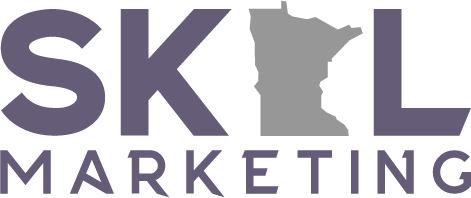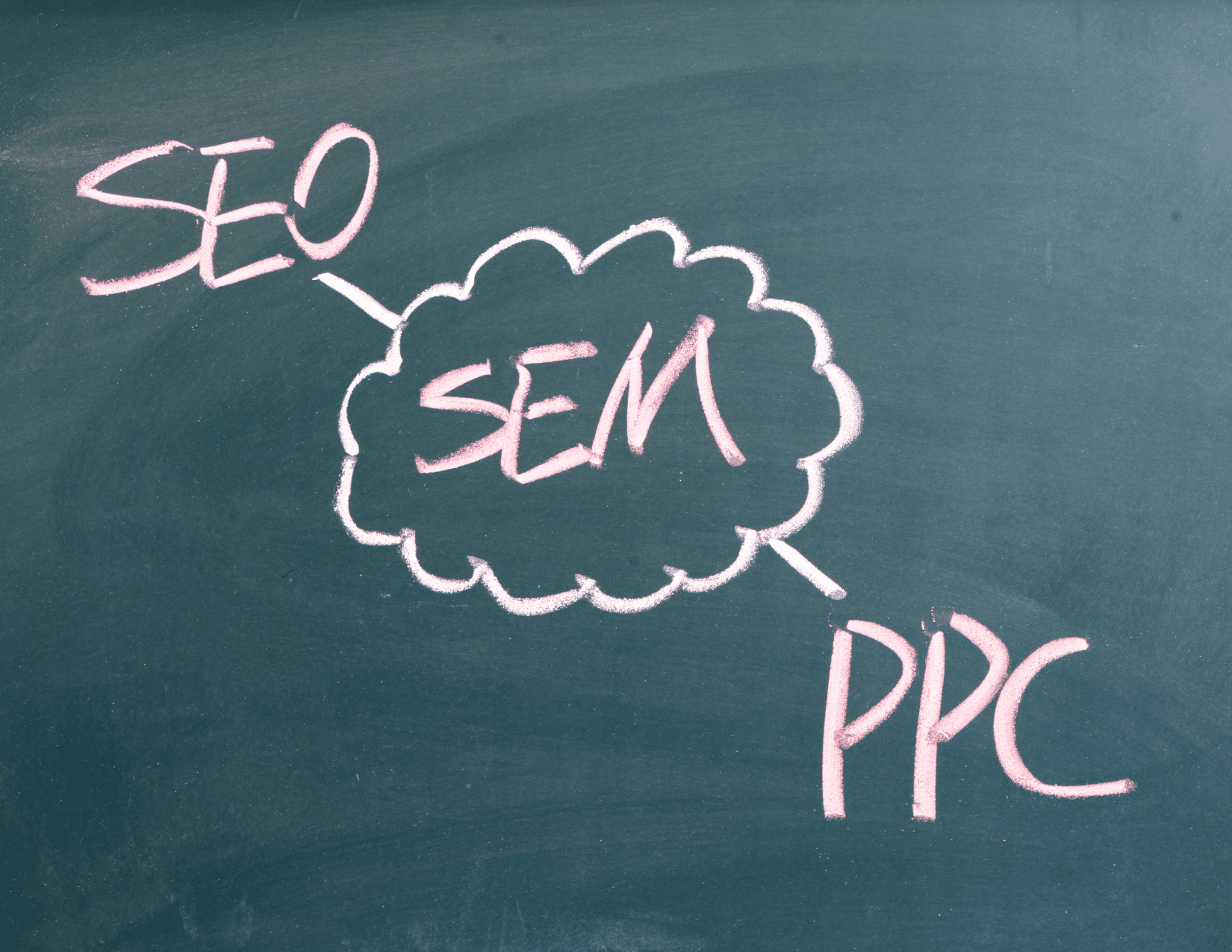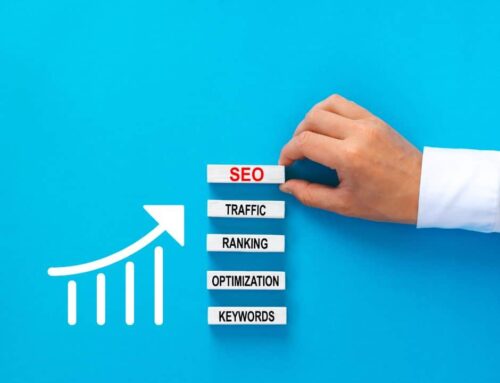When you’re just getting started with a new website or learning how to leverage search engines to your advantage, it’s easy to find your head spinning with all the various acronyms, initialisms, and abbreviations. What does SEO mean? What does SEM mean? What does PPC mean? Should you use SEO or PPC? If you’re confused, don’t worry–you’re not alone. But hopefully, we can give you an introduction to what all these jumbled letters mean and what the advantages or disadvantages are of each approach.
Definitions of SEO, PPC, and SEM
Definition of SEO: SEO is short for Search Engine Optimization, which is the process of building and editing your website in such a way that search engines (primarily Google) will show your site in the results that matter most to you and your business. It’s fun to think of a search engine result being populated by an incredibly smart concierge-type of person working behind-the-scenes, but this obviously is not the reality. Every search engine operates algorithmically, meaning they run a program that scans websites and–based on a set of guidelines for the content and quality of a site–automatically populate results for searches that they anticipate will be relevant and useful for their users.
This means that you can optimize your website to appear in the search engine results you want (hence the name “search engine optimization”) by building in a highly responsive manner, making it easy to navigate, and filling it with copy, pictures, and information that closely matches what your target audience is searching for. These are typically free steps you can take (aside from the cost of time/labor) to greatly improve your site’s relevancy and likelihood to pop up in the searches you want.
Definition of PPC: PPC is short for Pay Per Click, which is the standard method of paying for advertising within search engines. Colloquially, PPC is used as shorthand for any type of search engine paid to advertise such as Google Ads. When you search using an engine like Google, you’ll see results labeled as “ads” or “sponsored,” often at the top of a search. These pages are paying to bypass parts of the algorithm and appear automatically in the results for certain search terms. When you use a paid system such as Google Ads, you typically do not have to pay to run your ad, but you do pay every time somebody clicks on your result, which is why these systems are referred to as “pay per click” or “PPC” for short.
Definition of SEM: SEM is short for Search Engine Marketing, a broad phrase with varying definitions. Commonly, SEM is used as a synonym for utilizing PPC ads you see when making a Google search, but the truth is that it’s more of an umbrella term that encompasses all the paid actions you may take to market your business using search engine-based platforms. SEM is more than just Google Ads–standard PPC ads are part of it, but visual display advertising, youtube/video advertising, and more all make up parts of various modern SEM strategies. If you’re paying to directly place an ad that puts you ahead of organic search results, that’s SEM.
Still confused? Here it is, simply put: SEM is the term we use to describe any paid advertising efforts done through search engines, which includes PPC ads. SEO works to make your website more relevant and improve your unpaid, organic search results.
What are the advantages of SEO vs PPC?
The pros and cons of SEO vs SEM are often framed as a matter of time vs money, but there’s much more nuance to it than that. A more accurate way to consider it would be a matter of up-front monetary investment yielding potentially instant gratification (SEM) vs putting in more labor in return for long-term gain (SEO).
Of course, many smart companies find benefit in using a combination of SEO and SEM, primarily relying on organic search but using PPC ads to improve results for certain harder-to-optimize search terms. Others still may use SEO to make PPC ads more effective–this can be especially useful for a business targeting search terms with a lot of competition from other companies using paid advertising (if two competing companies are both paying for Google Ads, strong SEO determines which ad gets the most clicks, for example).
Pros and Cons of SEO:
-
- PRO: With SEO, there’s no up-front monetary cost inherent in tweaking your website content, and much of the work can theoretically be done yourself. If you’re willing to put in the sweat equity (which, make no mistake, is often a major time investment in and of itself), you can avoid having to hand over a big chunk of change to SEM platforms.
- PRO: The benefits of SEO can be dramatic. Top organic search results can see much stronger engagement than the top paid search results, stemming from factors such as higher consumer trust and the fact that they’re unaffected by ad blockers.
- PRO: SEO can help your website, even outside of search engines. The aspects of a website that make it appear high-quality to a search engine (responsiveness, ease of navigation, quality/relevant content) are also the sorts of changes that will make a potential customer more likely to complete a sale once they’re on your website.
- CON: SEO may not have the up-front costs of PPC, but it can still be expensive when you factor in the time and labor it takes to change your website and create high-quality copy, images, video, etc.
- CON: SEO work can take a long time to yield results. While this long-term performance improvement can be hugely beneficial, those looking for an instantaneous change in their site ranking may find themselves frustrated with the lack of immediacy.
- CON: No guaranteed results. Even a perfectly optimized website is not guaranteed to be placed at the top of any given search result, especially if a search term is very popular or sees heavy focus from large corporations with massive budgets.
- CON: Search algorithms change over time–a perfectly optimized website today may not match what a search engine is “looking for” in a month or a year. Even saying “perfectly optimized” can be misleading, as SEO is a process that’s never truly complete.
Pros and Cons of PPC:
- PRO: PPC is very approachable. Any search engine ad platform wants you to easily take advantage of their services and are therefore full of guided tutorials, technical support, knowledge bases, and other tools to help you jump in and get started.
- PRO: PPC can give you immediate results. Assuming you have a decent website, it’s possible to set up a PPC ad in less than 10 minutes and start seeing new clicks and a return on your investment.
- PRO: PPC lets you skip the line. After all, that’s what you’re paying for–not to have your website hidden at the bottom of Google page 3, but to show up right at the top, visible to anybody searching.
- PRO: PPC offers less uncertainty. You don’t have to worry about algorithm changes, you can A/B test different ads to optimize your campaign, and once you have a campaign running the way you like, you can essentially “set and forget” without worry.
- CON: PPC may offer lower ROI (when not paired with SEO efforts). A well-run SEO campaign will usually see higher click-through rates than a similarly well-run PPC campaign, just due to the inherent nature of how people interact with the platform.
- CON: Costs can vary massively depending on your industry and your product/service. Common, popular search terms will often have a much higher cost per click (say, several dollars per click), while more niche terms will often be cheaper (maybe only a few cents per click).
- CON: PPC costs money! SEO may have costs associated with time and labor, but there’s no getting away from the up-front costs of PPC.
So should you use SEO or PPC?
We can tell you straight off the bat that everybody should be engaging in some type of SEO practices. There is no reason to not want your website ranking higher in organic search, and as we’ve gone over, a strongly optimized website can help your PPC click-through rates and also improve your conversation rates once a potential customer is on your website. If you’ve never engaged in SEO before, there’s likely a lot of “low-hanging fruit” issues that are incredibly easy to fix and can give you a nice organic search boost, so there’s no excuse to not at least do some SEO work to your website.
As for SEM options, there are many circumstances under which a paid advertising program can be very effective. Primarily, PPC ads can be a great solution for companies that want the most control over their ad placement: if you want to target a very specific demographic, or very specific search terms, and are willing to invest money to really hyper-focus on these targets, PPC may be for you. Additionally, for companies competing against larger corporations or competitive search spaces (such as retail), PPC ads can help you get in front of potential customers in a way that would be incredibly difficult to do otherwise. At the same time, the up-front costs associated can stress your budget, especially in these same search spaces. SEM won’t be right for every site, but for those for whom it works, it can be a valuable part of your digital strategy.
Of course, if you prefer to leave all this in the hands of professionals, Skol Marketing offers search engine marketing services to help you navigate one of the web’s trickiest and most competitive marketing spaces. If you’d prefer one-on-one guidance or would like to discuss how our assistance can help you grow and maintain your business’ customer base, please don’t hesitate to contact the local search engine marketing experts at Skol Marketing.







